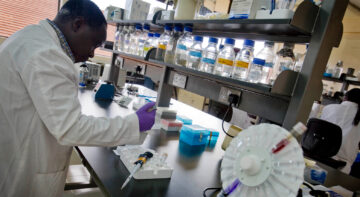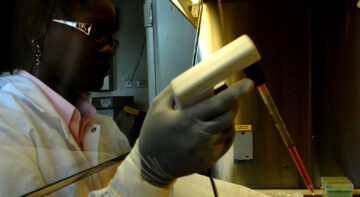Blogs

An odd question, you think.
But the bow-tie in question is one we all had from birth. It’s called the thyroid gland – a small but mighty organ located in the lower part of the front of our necks. It secretes two main hormones, triiodothyronine and thyroxine, which we shall call T3 and T4. Both hormones circulate in our bodies to accomplish quite a few tasks. They are involved in regulating the heart, our body metabolism, our brains and nerve networks, muscles, reproductive systems, and so forth. These hormones act by interfering with these systems and regulate the speed or rate at which body processes work in the brain and nervous system, heart, muscle, and digestive system. Thyroid hormones act on points in body cells called intranuclear receptors to bring about their effects. In women, they also affect ovulation, menstruation and fertility.[i]
Iodine and the thyroid
The thyroid depends on iodine taken in from our diet in order to make its hormones. Sources of iodine in our diet include iodized salt, dairy products, eggs, seafood such as shrimp, and fish such as tuna. Iodine is a micronutrient – we need quite small quantities of it. For instance, we need about 150 micrograms of iodine in our daily diet to supply what our bodies require.[ii]
Diseases of the thyroid gland
Hyperthyroidism
Overactivity of the thyroid gland leads to overproduction of its hormones; a condition called hyperthyroidism. Globally, countries have reported an incidence of hyperthyroidism ranging from 0.2-2.9%. This large variation has been attributed to several factors, most importantly the level of iodine in their diet. In some instances, the body’s immune system fights against itself (autoimmunity) and overstimulates the gland to produce hormones. Infections from bacteria and viruses may result in high levels of thyroid hormone in circulation (thyroiditis). High levels of iodine circulating in the body may also cause hyperthyroidism. When the gland that produces the controlling thyroid hormone is overstimulated due to tumours within it or inappropriate stimulation, this may also result in a hyperthyroid situation. More rarely, deposits from thyroid cancer and ovarian tumours can produce high levels of thyroid hormone.[iii]
Hyperthyroidism makes affected people feel hot all the time, in fact they feel hot even in cold weather. Thus, they sweat excessively. They are hyperactive, restless, and fidgety with short attention spans, which is devastating for sufferers. Their hands may shake (tremors), with a propensity for dropping things. In addition, they may observe that they lose weight drastically despite having a huge appetite. Their heart rate picks up to compensate for increased body metabolism and changes to a pounding sensation. When this is prolonged, the heart may fail (heart failure) due to the strain of the extreme workload. In some cases, such as with diffuse toxic goitre (Graves’ disease), the eyes may protrude, this is called proptosis. Affected women may also observe reduced menses and infertility. A lady went to see her doctor because she was unable to have a second pregnancy. Among other tests, her doctor found out that she was hyperthyroid. She was sent for radioactive iodine treatment in order to cure her condition, and improve her chances of becoming pregnant.
Another example is a family of mother and her two daughters with hyperthyroidism. An older daughter was the first to seek treatment. She was treated and subsequently had her baby. She then encouraged her younger sister to seek treatment. This sister had even worse symptoms, her heart had been badly affected. She was also treated successfully with radioactive iodine capsule. Lastly, their mum also came for treatment, and was similarly treated.[iv]
My next post: How to detect and treat hyperthyroidism
https://yettyz.wordpress.com/2021/08/02/whats-in-a-bow-tie-your-thyroid/
 Dr Yetunde Onimode is a nuclear medicine physician and lecturer at the University College Hospital and University of Ibadan College of Medicine in Nigeria. Dr Onimode was a fellow under the Enhance DELTAS programme and this blog was written as part of the ENHD 101 cohort 1 training programme.
Dr Yetunde Onimode is a nuclear medicine physician and lecturer at the University College Hospital and University of Ibadan College of Medicine in Nigeria. Dr Onimode was a fellow under the Enhance DELTAS programme and this blog was written as part of the ENHD 101 cohort 1 training programme.
Related Posts





